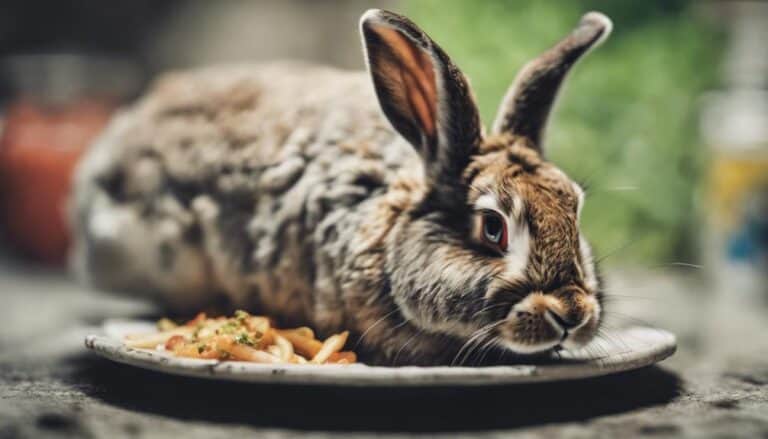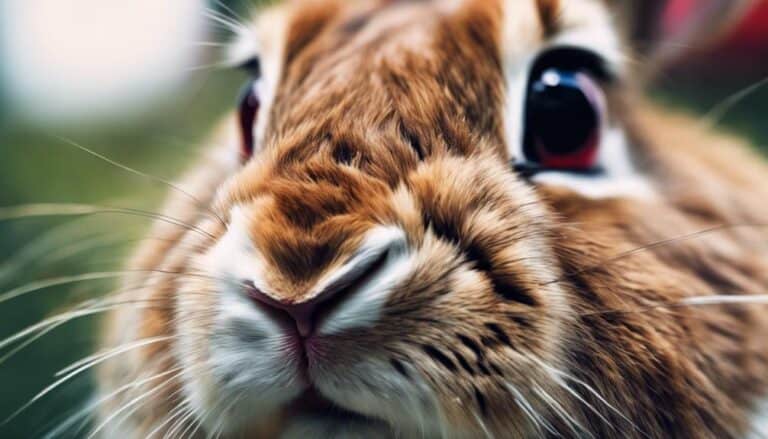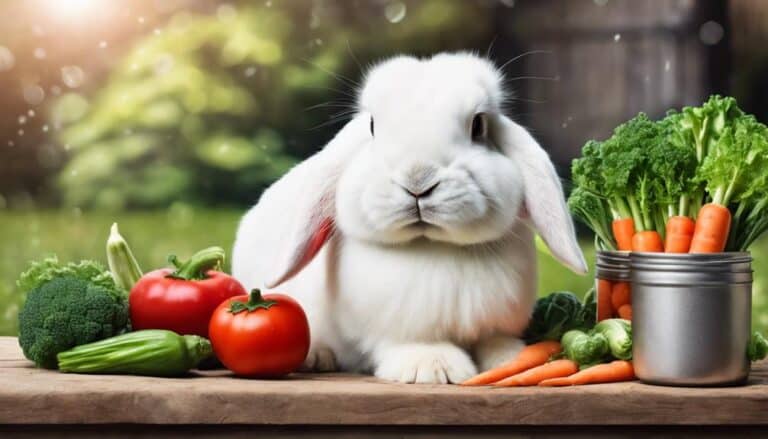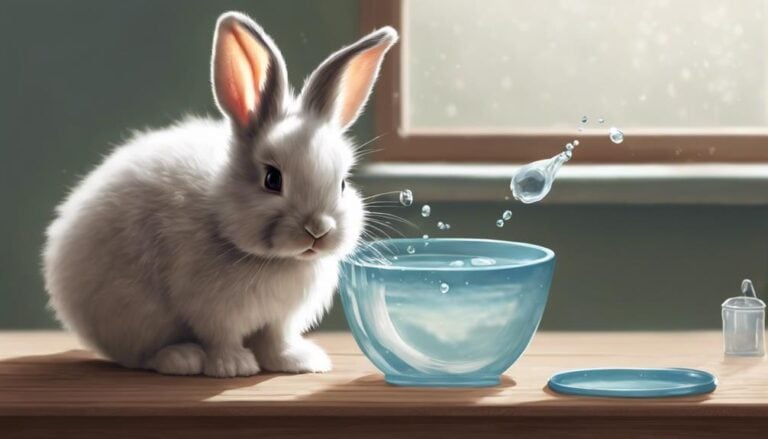So you're wondering what to feed your rabbit in India?
The first thing to consider is their dietary needs. It's super important to get this right, as a well-rounded meal plan is crucial for their overall well-being.
Hay is a great place to start. It's the foundation of a rabbit's diet, and it's essential to get it right.
But hay alone isn't enough. Fresh veggies are also a must, as they provide the essential nutrients your rabbit needs to thrive.
Now, about pellets and treats – how much should you give, and how often?
And let's not forget about hydration.
Getting the balance right can be tricky, but don't worry, we're here to help you navigate the world of rabbit nutrition in India.
By the end of this, you'll know exactly what to feed your furry friend to keep them happy and healthy.
Contents
- 1 Key Takeaways
- 2 Hay: The Foundation of Their Diet
- 3 Fresh Vegetables: Essential Nutrients
- 4 Limited Pellets: Fiber and Protein Balance
- 5 Occasional Treats: Fruits for Variety
- 6 Clean Water: Hydration Is Key
- 7 Toxic Foods: What to Avoid
- 8 Homemade Options: DIY Rabbit Food
- 9 Additional Considerations: Seasonal Feeding Tips
- 10 Conclusion
Key Takeaways
So, you're wondering what to feed your rabbit in India? Well, let's break it down.
First, make sure your rabbit has access to plenty of Timothy or oat hay. This is crucial for their digestion and dental care. They need to chew on something, and hay is perfect for that.
Next, provide your rabbit with fresh veggies like kale and bell peppers. These are packed with essential nutrients that your rabbit needs to stay healthy. Just remember to introduce new veggies gradually to prevent digestive upset.
Now, about pellets – they should only make up about 5% of your rabbit's daily intake. Any more than that, and you risk upsetting their digestive system.
Oh, and don't forget to ensure your rabbit always has clean water and stays hydrated. This is critical to preventing gastrointestinal issues.
Finally, be sure to adjust your rabbit's diet according to the season, and keep an eye on the quality of the food you're giving them. This will help maintain their overall health and well-being.
Hay: The Foundation of Their Diet
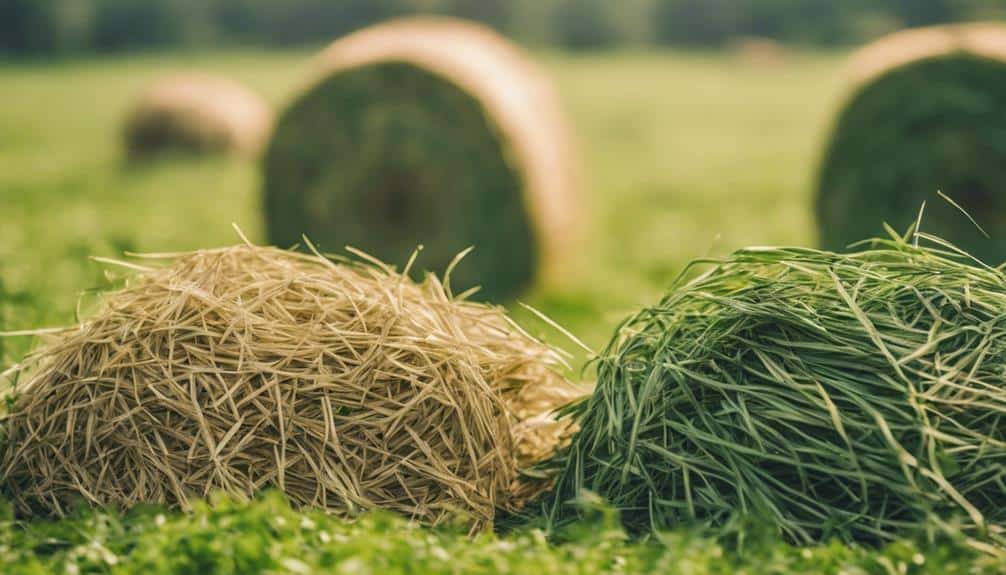
Hay is the foundation of your rabbit's diet, making up 70-80% of their daily nutritional needs. It's essential for maintaining their digestive health.
The high fiber content in hay prevents hairballs from forming and promotes good dental health. For optimal digestive function and dental care, it's best to provide Timothy or oat hay. These types are gentle on your rabbit's system and help wear down their teeth.
Make sure the hay is fresh, free from mold or dust, and always available. Even if your rabbit doesn't eat much hay at first, offering fresh hay multiple times a day can encourage them to eat more and reduce their pellet intake.
Hay is more than just food for your rabbit; it's also a stress-reliever and essential for their overall health. That's why providing high-quality hay consistently is crucial for your rabbit's well-being.
Fresh Vegetables: Essential Nutrients
To keep your rabbit healthy and happy, you need to add fresh veggies to their hay-based diet. Fresh veggies are packed with vitamins, minerals, and fiber that are essential for your rabbit's overall health.
When it comes to choosing veggies for your rabbit, go for a mix of leafy greens like kale, spinach, and romaine lettuce. These greens are super rich in nutrients and provide important vitamins like A and K. You should also try adding veggies like bell peppers, carrots, and broccoli to give your rabbit a range of nutrients and flavors to enjoy.
Green beans are another great veggie option for rabbits. They're low in calories and high in fiber, making them a healthy choice. Plus, Timothy grass is a nutritious addition that can help support your rabbit's digestion and dental health.
Just remember to introduce new veggies slowly to avoid tummy troubles, and always wash them thoroughly to remove any pesticides or contaminants. By offering a variety of fresh veggies alongside fresh hay, you can give your rabbit a well-rounded and nutritious diet.
Limited Pellets: Fiber and Protein Balance
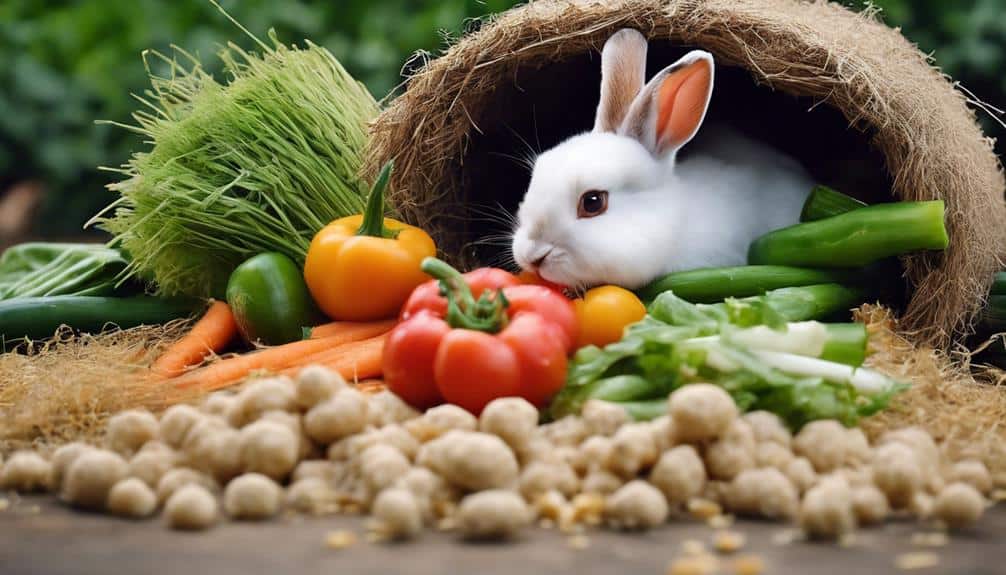
When you're thinking about what to feed your rabbit, it's really important to get the balance right between fiber and protein in their pellets.
You see, fiber and protein are crucial for a healthy digestive system and overall well-being.
If you get it wrong, your rabbit can end up with serious health problems.
So, how do you get it right?
Well, the key is to control the amount and quality of pellets you give your rabbit.
If you do it correctly, you'll be providing your pet with all the essential nutrients they need without overfeeding them or causing nutritional imbalances.
It's all about finding that sweet spot where your rabbit gets just what they need to thrive.
Balanced Nutrition Essentials
So, you want to make sure your rabbit is eating a well-rounded diet that meets their nutritional needs. The key is to limit their pellet intake to get the right balance of fiber and protein.
First, hay should be the main staple of their diet, making up 70-80% of what they eat. Hay is essential because it provides fiber, which helps with digestion, prevents hairballs from forming, and keeps their teeth healthy.
Next, add some fresh veggies to the mix. These should make up 15-20% of their daily intake. A good rule of thumb is to give them at least one cup of veggies per four pounds of body weight every day.
Now, about those pellets. They should only make up 5% of their diet. To get it right, limit the pellets to one egg cup per kilo of your rabbit's weight. This will ensure they're getting the right balance of fiber and protein, which is crucial for their overall health. Fiber is vital for digestive health, and limiting protein helps prevent kidney damage.
One more thing to keep in mind: it's essential to keep sugar content low in your rabbit's diet. So, offer fruits and high-sugar veggies sparingly to avoid digestive issues and obesity.
Pellet Quantity Control
Limiting the quantity of pellets in your pet rabbit's diet is crucial. These commercial pellets, although rich in minerals and vitamins, should make up only a small part of their daily food intake – about 5%. The rule of thumb is to feed your rabbit one egg cup of pellets per kilo of their weight.
This will prevent health issues that can arise from eating too many calories.
Rabbits have a delicate digestive system, and it needs a high-fiber diet to function properly. So, it's essential to limit the amount of pellets you give them to ensure they get enough fiber while also balancing their protein intake.
On average, a rabbit's daily food consumption should be around 130g of various foods, including fruits, grains, and veggies, with pellets making up only a small part of this total.
To keep your pet rabbit healthy, it's better to opt for whole grain, limited pellets over muesli-style foods.
These can lead to dental and gastrointestinal problems if you overfeed them.
Be mindful of your rabbit's diet to support their overall well-being, which is necessary for their longevity.
Occasional Treats: Fruits for Variety
Fresh fruits can be a great way to add some variety to a rabbit's diet and provide a range of nutrients and flavors. Just remember, fruits should only be given in moderation because they're high in sugar.
Hay and grass are still the main staples of a rabbit's diet, but fruits can be a nice addition if you do it correctly. Fruits are packed with vitamins, minerals, and antioxidants that can really benefit a rabbit's overall health.
The key thing to keep in mind is to only give fruits in limited amounts. You need to be careful about the sugar content and make sure it doesn't overshadow their main diet of hay and grass.
Apple is high in fiber and vitamin C. Give them 1-2 slices, but make sure to remove the seeds.
Blueberries are rich in antioxidants and vitamin C. They can have 1-2 berries as a treat.
Banana is a good source of potassium and vitamin B6. Give them 1-2 slices, but not too often.
Papaya contains digestive enzymes and vitamin A. They can have 1-2 tablespoons as an occasional treat.
Clean Water: Hydration Is Key
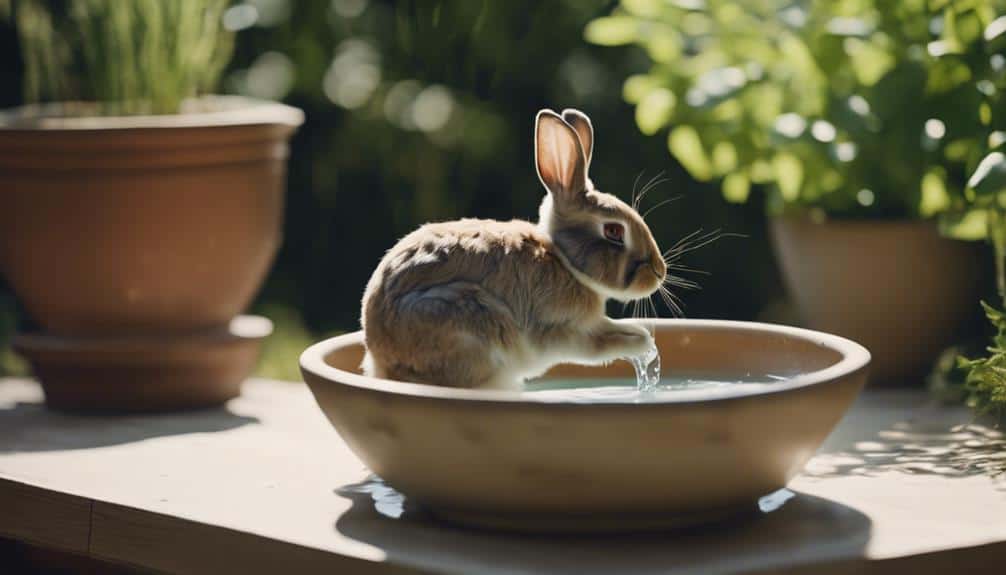
Clean water is a must-have for your rabbit's health. They need a constant supply of fresh, clean water to stay healthy. So, make sure to provide a water bottle or bowl that you change daily to prevent contamination.
Hydration is key in aiding digestion, regulating body temperature, and overall well-being.
In addition to water, your rabbit needs a diet rich in fiber. Fiber is essential for maintaining good gut health in rabbits by promoting proper digestion and preventing gastrointestinal issues.
Grass hay is a great source of fiber, so make sure your rabbit has unlimited access to it. You can offer timothy, oat, or brome hay – just make sure it's always available.
Toxic Foods: What to Avoid
Toxic Foods: What to Avoid
When it comes to feeding your rabbit, it's crucial to avoid toxic foods that can harm their health and well-being. What might be safe for you can be toxic to your rabbit, so it's essential to know the difference.
Chocolate, caffeine, and alcohol are all no-nos, as are dairy products. You should also steer clear of raw beans, rhubarb, onions, garlic, iceberg lettuce, and potato tops.
While fruits are generally safe, make sure to remove seeds like apple seeds, which contain cyanide. Spinach is another food to approach with caution. It contains oxalic acid, which can interfere with calcium absorption and lead to bladder sludge or even kidney stones if eaten in large amounts.
However, small amounts of spinach are generally okay. Be moderate with high-sugar fruits like grapes and bananas, too.
Before introducing a new food to your rabbit's diet, always do your research. If you're unsure about a specific food, it's better to err on the side of caution and avoid it altogether.
Homemade Options: DIY Rabbit Food
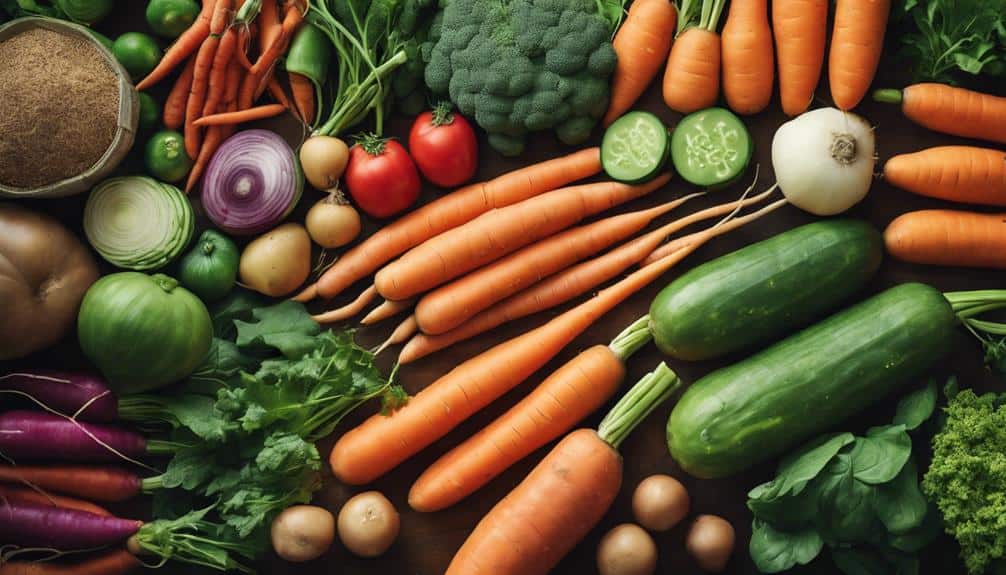
When it comes to feeding your rabbit, you might want to consider making their food at home. This way, you can tailor their diet to their specific nutritional needs.
The foundation of a rabbit's diet should be grass, which is packed with fiber that helps with digestion and keeps their teeth healthy.
You can mix things up by adding some leafy greens like kale, spinach, and herbs like parsley and cilantro. These add variety and essential vitamins to their diet.
In small amounts, you can also include veggies like carrots, bell peppers, and broccoli to create a balanced and nutritious diet. Just be sure to avoid foods high in sugar and starch, as these can cause digestive problems.
Hay is another important addition to their diet. It provides roughage that helps wear down their teeth and maintain gut health.
Additional Considerations: Seasonal Feeding Tips
As a rabbit owner in India, you know how the changing seasons can impact your pet’s health. So, it’s essential to adjust their diet accordingly to ensure they receive the necessary nutrients throughout the year. During the hot months, it’s important to provide your rabbit with plenty of fresh water and hydrating foods, while in the cooler seasons, adding more fiber-rich hay can help maintain their digestive health. Additionally, considering how different climates affect white rabbit habitats in India can guide you in creating a comfortable environment for your pet. By monitoring temperature changes and adjusting their care routine accordingly, you can keep your rabbit healthy and happy all year round.
During the summer months, the heat can be unbearable for rabbits. To help them combat heat stress, make sure they've access to plenty of water and electrolyte-rich foods like cucumbers, melons, and carrots. These foods will help keep them hydrated and cool.
In the winter, rabbits need a little extra help to stay warm. You can do this by increasing their calorie intake, which can be achieved by adding small amounts of healthy fats like nuts and seeds to their diet.
Seasonal changes also require some adjustments to your rabbit's living space. For instance, during the summer, it's crucial to provide their enclosures with proper ventilation, shade, and cooling measures to prevent heatstroke.
On the other hand, during the monsoon season, be cautious with fresh fruits and vegetables as they may spoil faster, leading to digestive issues in rabbits.
To prevent these issues, monitor the quality and freshness of their food, and make sure to remove any spoiled or rotten food from their diet.
This will help maintain your rabbit's digestive health throughout the year.
Conclusion
Hay should be the main staple of your rabbit's diet. It's essential for their digestive health and helps keep their teeth trimmed. You can opt for timothy hay or oat hay, which are readily available in India.
Fresh veggies are also a must-have for your rabbit. You can give them leafy greens like spinach, collard greens, or kale. Carrots, cucumbers, and bell peppers are also great options. Just make sure to introduce new veggies gradually to prevent digestive upset.
Pellets should be given in limited quantities, as they're high in calories and can lead to obesity. Look for pellets specifically formulated for rabbits and avoid those meant for guinea pigs or hamsters.
Treats are okay in moderation, but choose healthy options like dried fruit, carrot tops, or apple slices. Avoid giving them too many treats, as they can lead to weight gain and other health issues.
Remember to always provide clean water for your rabbit, and change it frequently to prevent bacterial growth. Also, be sure to avoid toxic foods like chocolate, onions, garlic, and avocado, which can be harmful to your rabbit's health.
Adjust your rabbit's diet according to the season. For example, in the summer, you can give them more veggies with high water content to help them stay cool. In the winter, you can provide more hay to keep them warm.
By following these guidelines, you'll be able to provide a nutritious diet for your rabbit and ensure they live a long, happy life.

